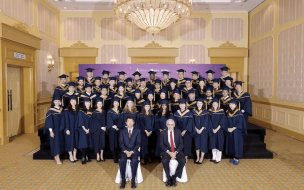As global Fortune 500 companies increase their hiring of Master in Finance graduates, the program is becoming an increasingly attractive option—according to the Graduate Management Admission Council, 52% of Master of Finance programs reported growth last year.
It’s not only jobs in the finance sector that are open to Master in Finance graduates, though—both the energy and the manufacturing industry are reportedly increasing their hiring of Master of Finance grads this year.
Specifically, a Master in Finance can be the perfect addition to a background in real estate—as was the case for Ben Tse, Han Liao, and Ken Ng.
They are graduates from the Master of Science in Global Finance from HKUST and NYU Stern, which aims to give students a truly international view of finance, and with modules ranging from Asset Allocation to Behavioral Finance, as well as dipping into crucial, new subjects like fintech and Asia’s emerging financial markets, graduation paths can vary.
“The core issue of real estate is about finance or investment, and asset management,” explains Han, “and HKUST Business School is definitely the best choice in Hong Kong if one hopes to study business and finance.”
For Ken, who has been with global investment firm Angelo Gordon since 2006, going back to the classroom also seemed the natural next step in his career. “I was thinking it was the right time to go back to recharge, especially because of the changes including government regulations and risk controls after global financial crisis,” he says.
Ben (pictured above) concurs. “I work in private equity in the real estate space—it’s a marriage between real estate and finance,” he explains. “The finance knowledge I gained in the classroom and from my classmates really adds a big plus to my real estate knowledge.”
Finance and real estate
Prior to starting the Master of Science in Global Finance, Han was already working in Hong Kong as a project manager for real estate firm New World Development Company Limited, and has a bachelors and master's degree in Urban Planning.
So why consider doing a finance degree? “China’s real estate policy and market is essentially changing,” explains Han. “The business mode of many real estate companies in mainland China is transforming. We cannot truly understand this trend and adjust our business direction without financial knowledge and skill.”
“Financial knowledge is becoming increasingly important in the real estate industry,” adds Ben. “From financial modeling, valuation, capital financing, currency hedging, asset allocation—real estate investment is very much finance related,” he adds.
Though Han’s work is in the real estate industry in China and Hong Kong, he cites his master’s degree as providing him with a truly international education.
In this year’s class of 2019, there were 18 nationalities represented in the classroom, with less than half from Hong Kong and China (42%)—students also hailed from the US, Canada, Russia, Colombia, Bangladesh, and Thailand.
“The one-year program was an impressive and memorable journey, during which you explore not only financial knowledge but also interact with people with various background—your classmates, professors, and guest speakers," says Han (pictured above).
For all these students, the location of the program—which is partly taught in Hong Kong, Shanghai, and New York—was ideal for getting to the heart of financial matters.
“This program ticked all of the boxes for me,” Ben says, and Ken agrees. “The curriculum is thoughtfully designed and taught by world-class faculty who are not only good at research, but also very practical and close to the market.”
A valuable degree
Since graduating from the program in 2018, Ben gained a role as business development director for Asia Pacific at Global Student Accommodation, a real estate and asset management firm catering for Purpose Built Student Accommodation (PBSA).
In such a varied role, with both financial and real estate knowledge required, Ben says that a program like that offered by HKUST and NYU Stern can be hugely beneficial.
“The program really helped fill in the gaps in my financial knowledge, and now gives our investors and clients a stronger sense of my finance knowledge when I try to present a real estate idea,” Ben explains.
For Ken (pictured above), who now works as the head of China Real Estate for Angelo Gordon, the program provided skills necessary for his job—despite not being a real estate degree. “The tools and knowledge learnt from the MS in Global Finance program are very practical and useful,” he asserts.
Han agrees. He’s in no doubt that he gained skills that have been crucial in his career since graduating.
“The program is not just beneficial for my career development in the short term,” he says. “It will be one of the most critical aspects to my life-long learning.”



.png)






